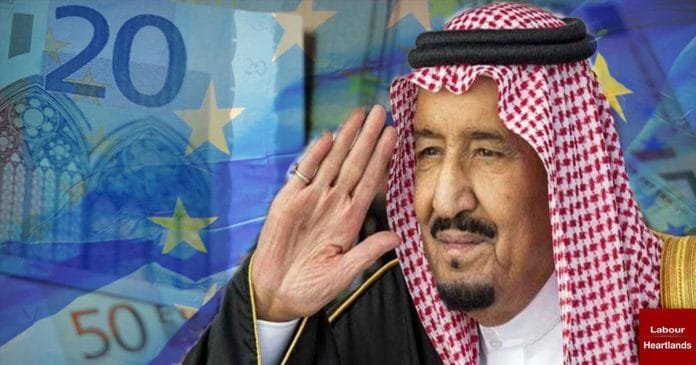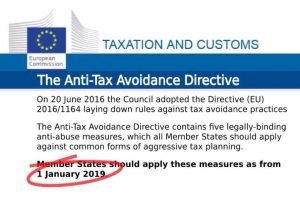
Plans for a European Union money-laundering blacklist stalled after objections by all but one of the bloc’s 28 governments.
The Commission last month published a list of 23 countries that it says are too lax on money laundering, including Saudi Arabia, Panama, and several American territories such as the U.S. Virgin Islands. The list, which needs the support of both the European Parliament and Council of the EU to come into effect, generated intense backlash and behind-the-scenes lobbying from the U.S. and Saudi Arabia.
A unanimous majority of European Union member states have moved to block a new EU money-laundering blacklist that includes Saudi Arabia and several US territories, following an appeal by Saudi Arabia’s King Salman bin Abdulaziz Al Saud.
The procedure to block the blacklist, which was originally adopted in line with previously-agreed EU rules to prevent money laundering, was launched on Thursday, according to Reuters.
The Financial Times has also reported that 27 of the EU’s total 28 countries, led by the UK, France, Germany, and the Netherlands, have pushed to block publication of the list.
A majority of 21 states is needed to veto the EU blacklisting regulation.
Individual EU states are expected to clarify their positions on the matter in a Friday meeting in the Belgian capital of Brussels. A formal decision will be made in the next two weeks.
EU government representatives agreed to block the blacklist when they meet at a Council meeting, the three diplomats said. EU ambassadors will formalise that decision on Wednesday. The bloc’s home affair ministers would then sign off on the rejection when they meet next Thursday.
Commission deputy chief spokesperson Mina Andreeva told journalists that the EU’s executive arm would only “assess the situation” once this process is completed next week.
“The fact that almost all countries balked at the new blacklist reveals just how diplomatically sensitive the initiative is.
Due Diligence
While the current list may not survive, EU governments have said they’re determined to stamp out dirty money after a series of scandals. Several of the bloc’s biggest banks, including Danske Bank A/S, Deutsche Bank AG and Swedbank AB, have been implicated in money-laundering allegations, raising doubts about the quality of supervision and enforcement across the continent.
Under the commission’s proposal, banks and other financial institutions would be required to apply increased due diligence checks on operations involving customers from 23 “high-risk third countries,” including American Samoa, Guam, the U.S. Virgin Islands, Puerto Rico, Saudi Arabia and Panama, to better identify any suspicious money flows.
This was the commission’s first list based on its own methodology, targeting more countries than those named by the Financial Action Task Force, a Paris-based global watchdog. A country was added if “strategic deficiencies” in its anti-money-laundering framework were identified.
“The rejection of the governments is a farce at the expense of security,” EU lawmaker Sven Giegold said in a statement. “France and the U.K. want to remove Saudi Arabia and other countries from the list. Spain is protecting Panama. The United States is exerting massive pressure because four U.S. jurisdictions,” he said.
EU Anti-Tax Avoidance Directive The measure will have effect in the UK from 1 January 2019.

The remain camp just like the Leaver camp in the UK is not adverse to perpetuating lies you will often see post from conspiracies that the only reason we had a referendum was for the rich to avoid the EU Anti-Tax Avoidance Directive fortunately that’s all they were conspiracies. The noose is tightening and would tighten more so under a Labour run HMRC
European Union (EU) Anti-Tax Avoidance Directive (ATAD) are transposed into UK tax law as required. Although the UK is scheduled to leave the EU on 29 March 2019 and the Withdrawal Agreement has not yet been finalized, it is expected that the UK will need to comply with the ATAD requirements at least throughout any transition period agreed. Consequently, the UK is proposing to implement any changes that would be required to be brought in by the ATAD by 1 January 2019 (when the UK will still be within the EU) or 1 January 2020 (which is expected to be within the transition period). Requirements that must be implemented by a later date are still under review.
The ATAD sets out a requirement for Member States to adopt certain anti-avoidance provisions to facilitate the creation of a ”level playing field” across the EU. The UK Government has assessed the ATAD requirements against the existing tax legislation and has concluded that changes are required in the following areas:
Controlled foreign company rules, which need to be applied with effect from 1 January 2019
Exit taxation rules (in particular, the deferral mechanisms applicable in certain circumstances), which need to be applied from 1 January 2020
Certain anti-hybrid rules, which need to be applied from 1 January 2020 (other ”reverse hybrid” changes are required by 1 January 2022 and are still under review)
The consultation on the draft legislation will run until 31 August 2018 and measures are intended to be included in what will become Finance Act 2019.
https://ec.europa.eu/taxation_customs/business/company-tax/anti-tax-avoidance-package/anti-tax-avoidance-directive_en
https://www.gov.uk/government/publications/controlled-foreign-companies-and-eu-anti-tax-avoidance-directive/controlled-foreign-companies-and-eu-anti-tax-avoidance-directive
Support Independent Journalism Today
Our unwavering dedication is to provide you with unbiased news, diverse perspectives, and insightful opinions. We're on a mission to ensure that those in positions of power are held accountable for their actions, but we can't do it alone. Labour Heartlands is primarily funded by me, Paul Knaggs, and by the generous contributions of readers like you. Your donations keep us going and help us uphold the principles of independent journalism. Join us in our quest for truth, transparency, and accountability – donate today and be a part of our mission!
Like everyone else, we're facing challenges, and we need your help to stay online and continue providing crucial journalism. Every contribution, no matter how small, goes a long way in helping us thrive. By becoming one of our donors, you become a vital part of our mission to uncover the truth and uphold the values of democracy.
While we maintain our independence from political affiliations, we stand united against corruption, injustice, and the erosion of free speech, truth, and democracy. We believe in the power of accurate information in a democracy, and we consider facts non-negotiable.
Your support, no matter the amount, can make a significant impact. Together, we can make a difference and continue our journey toward a more informed and just society.
Thank you for supporting Labour Heartlands








